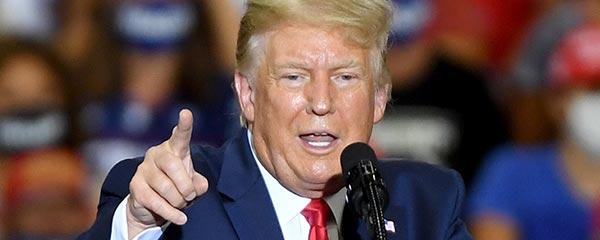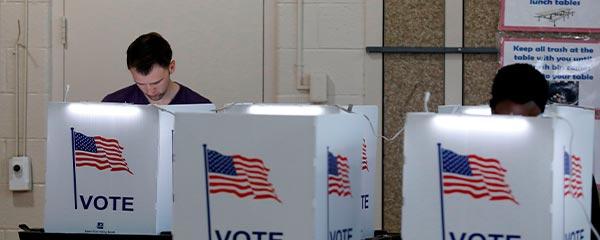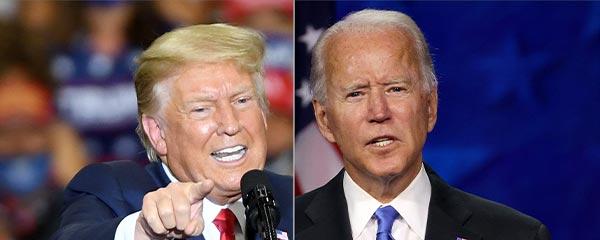Story Highlights
- 44% say candidate's stance on economy "extremely," 45% "very" important
- Terrorism, education, healthcare, important to at least 80%
- Healthcare tops Democrats' list; economy, national security top Republicans'
WASHINGTON, D.C. -- As the nation remains in a pandemic-induced recession, U.S. registered voters say the economy is the most important issue of 16 that may potentially affect their choice for president. Nearly nine in 10 registered voters consider the presidential candidates' positions on the economy "extremely" (44%) or "very" (45%) important to their vote.
At least three-quarters of voters consider six other issues to be important to their vote choice -- terrorism and national security (83%), education (82%), healthcare (80%), crime (79%), the response to the coronavirus (77%), and race relations (76%).

Bar graphs. Americans' views on the importance of 16 issues in influencing their vote for president. The economy, terrorism and national security, the response to the coronavirus and healthcare are at the top of the list of important issues. Relations with Russia and China are the least important.
Majorities of voters say eight of the nine remaining issues are extremely or very important. These include foreign affairs (74%), gun policy (68%), immigration (65%), the federal budget deficit (65%), relations with China (64%), abortion (61%), taxes (61%), and climate change (55%). Only one issue -- relations with Russia -- is viewed as important to less than a majority of voters (49%).
Compared with the previous reading on these measures among all U.S. adults from last December, the latest findings, from a Sept. 14-28 Â鶹´«Ã½AV poll, highlight just how much has changed in the U.S. since then. Specifically, the importance of the coronavirus and its impact on the economy are evident in the latest findings. The proportion of voters saying the economy is extremely important rose from 30% to 45% between December and September.
Likewise, the rise in the extreme importance of race relations from 23% in December to 40% now comes as the nation continues to grapple with racial injustice following the deaths of George Floyd, Breonna Taylor and others in incidents involving police.
The economy is typically rated as a highly important issue in helping voters decide whom to support in presidential elections. This was especially the case in 2008 amid the Great Recession when 55% of voters said it was of the utmost importance. In each presidential election year since 1996, between 85% and 95% of registered voters have rated the economy as extremely or very important.
Voters have also historically been likely to consider national security and education as key factors in their vote choice. Since 2003, an average 83% of voters have said terrorism or national security is important, and since 1996, an average 85% have said education is.
Partisans Diverge in Prioritization of Importance of Issues
Unlike in 2016 when partisans viewed the same top issues as important, Republicans and Republican-leaning independent voters and Democrats and Democratic-leaning independent voters this year diverge in their ratings of the importance of each.
Looking at the issues that are rated extremely or very important to vote choice by at least three-quarters of partisan voters, there are few similarities beyond both partisan groups viewing the economy and education as important to some degree.
The rank order of Democrats' issues priorities is healthcare, the coronavirus response, race relations, climate change, the economy and education. Meanwhile, Republicans assign the most importance to the economy and national security, followed by crime, education, and gun policy.

Bar graphs. Partisans' views of the importance of 16 issues in influencing their vote for president. Democrats and Democratic-leaning independents prioritize healthcare, the coronavirus response, race relations, climate change, the economy and education. Meanwhile, Republicans and Republican-leaning independents assign the most importance to the economy, national security, crime, education, and gun policy.
Majorities of Democrats consider their top four issues to be extremely important, while Republicans' extreme importance does not reach the majority level for any of the issues.
The largest gap between partisans is in how important they consider climate change -- 88% of Democrats rate it as important compared with 23% of Republicans. Wide disparities are also seen in the importance of healthcare, the response to the coronavirus (32 points) and race relations (27 points). At the same time, Republicans place significantly more emphasis than Democrats do on several other key voting issues, including terrorism or national security (22 points) and taxes (18 points).
Bottom Line
It is not surprising that voters overall rate the economy as the most important issue impacting their vote for president this year given the fragile state of the U.S. economy and their tendency historically to prioritize it and other issues such as national security and education.
Although Americans' economic confidence has improved from its recent low point in March, the unemployment rate remains the highest of any president heading into an election since 1948. President Donald Trump's approval rating on the economy, measured before the latest labor report showing hiring has slowed, remains his greatest strength, but this will likely only help him with his base. Democratic voters' issue priorities -- healthcare, the response to the coronavirus, race relations and climate change -- have not been areas of strength for the president.




